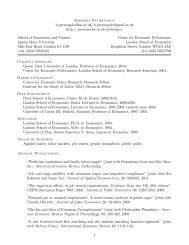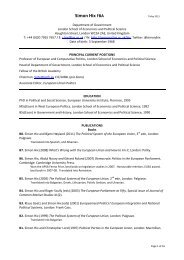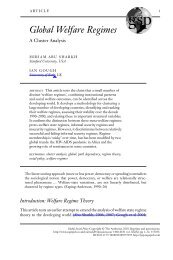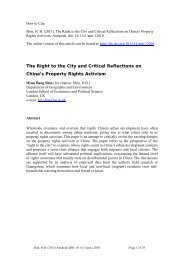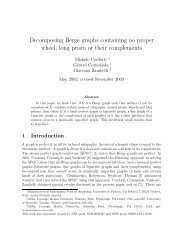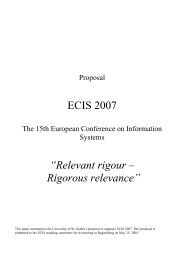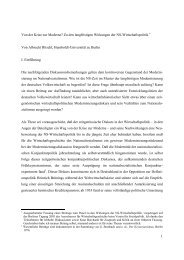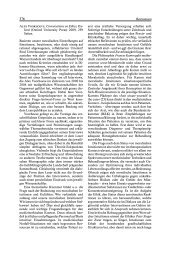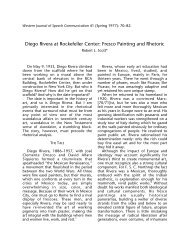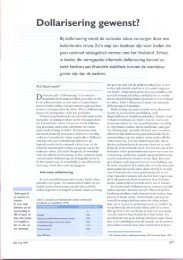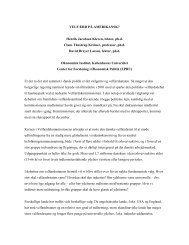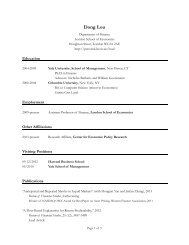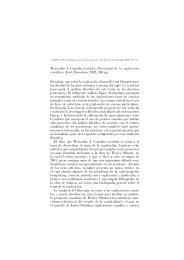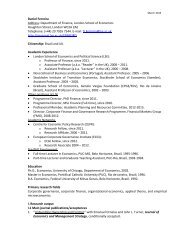The Rejected, the Ejected, and the Dejected: Explaining ...
The Rejected, the Ejected, and the Dejected: Explaining ...
The Rejected, the Ejected, and the Dejected: Explaining ...
You also want an ePaper? Increase the reach of your titles
YUMPU automatically turns print PDFs into web optimized ePapers that Google loves.
Benedetto, Hix / Government Rebels in House of Commons 757<br />
government in <strong>the</strong> 2001-2005 British House of Commons. In <strong>the</strong> empirical<br />
section of <strong>the</strong> article, we test <strong>the</strong>se ideas by looking at <strong>the</strong> voting behavior<br />
of Labour MPs in all votes in <strong>the</strong> 2001-2005 Parliament <strong>and</strong> in three highprofile<br />
votes: on <strong>the</strong> Iraq War, hospital reforms, <strong>and</strong> university fees.<br />
Research on Government Rebellion<br />
in <strong>the</strong> British House of Commons<br />
Scholars have studied voting in <strong>the</strong> House of Commons since William<br />
Aydelotte’s (1954, 1963) research on <strong>the</strong> House in <strong>the</strong> 1840s. Rebellions<br />
against <strong>the</strong> government have been rare because party leaders can use ministerial<br />
patronage to enforce discipline, because <strong>the</strong> electoral success of<br />
MPs is dependent on <strong>the</strong> effectiveness of <strong>the</strong> party leadership, <strong>and</strong> because<br />
potential rebels expect that government collapse could lead to subsequent<br />
electoral defeat. Existing research has also demonstrated that when rebellions<br />
have occurred, <strong>the</strong>se have tended to be because of ideological differences<br />
between backbenchers <strong>and</strong> <strong>the</strong> leadership ra<strong>the</strong>r than because of<br />
pressures from constituency interests relevant to a vote or set of votes.<br />
Schonhardt-Bailey (2003) showed that constituency interests prevailed<br />
over ideology in <strong>the</strong> battle over <strong>the</strong> Corn Laws in <strong>the</strong> 1840s. Most MPs from<br />
constituencies that would benefit from free trade voted to repeal <strong>the</strong> Corn<br />
Laws, irrespective of <strong>the</strong>ir party affiliation. Cox (1987) argues, however, that<br />
national party platforms were not fully developed in <strong>the</strong> 1840s, so politicians<br />
were more beholden at that time to <strong>the</strong>ir constituencies than to <strong>the</strong> electoral<br />
promises of <strong>the</strong>ir party leaders. Also, ministerial patronage was not a powerful<br />
force until later. Looking at roll-call votes in <strong>the</strong> 1860s to <strong>the</strong> 1880s,<br />
Cox (1987, pp. 77-78) found that Conservative MPs who later became ministers<br />
were 6% more likely to following voting instructions than MPs who<br />
were not promoted to ministerial office.<br />
<strong>The</strong> carrot of ministerial promotion plus <strong>the</strong> national electoral connection<br />
prevented major backbench rebellions until <strong>the</strong> 1960s (Norton, 1975,<br />
1980). Schwartz (1980) attributed <strong>the</strong> emergence of rebellion after 1960 to<br />
<strong>the</strong> ab<strong>and</strong>onment of <strong>the</strong> so-called “parliamentary rule,” whereby a government<br />
would resign if it lost any vote. Looking at 10 rebellions from 1959<br />
to 1968, Schwartz <strong>and</strong> Lambert (1971) found that, freed from <strong>the</strong> threat of<br />
new elections if a government was defeated, rebels tended to be<br />
Conservative backbenchers who ei<strong>the</strong>r did not expect to be promoted to<br />
ministerial office, who were not mainstream members of <strong>the</strong> party, or who<br />
had strong support from <strong>the</strong>ir local party constituency associations. Jackson<br />
Downloaded from<br />
http://cps.sagepub.com at SWETS WISE ONLINE CONTENT on July 6, 2007<br />
© 2007 SAGE Publications. All rights reserved. Not for commercial use or unauthorized<br />
distribution.



